The Labor Department will make changes to a proposal to raise investment advice standards for retirement accounts as soon as it digests thousands of comments letters, the official spearheading the rule said Tuesday.
“You're likely to see that feedback's going to be reflected in the final rule,” Timothy Hauser, deputy assistant secretary of labor, said at a meeting of the Investment Management Consultants Association in Washington. “We're taking every bit of it seriously.”
The rule is designed to reduce conflicts of interest for brokers working with 401(k) and individual retirement accounts. It does that in large part through a legally binding contract that allows brokers flexibility in how they charge for their services as long as they commit to acting in clients' best interests.
The operational details of the contract have become a major source of concern for the industry and are the topic of much of the input to DOL, Mr. Hauser said.
The agency will consider simplifying the mechanics and timing of the contract, Mr. Hauser said. It also will review expanding the types of assets that would be allowed in retirement accounts, changing how the contract applies to existing clients and extending the transition time for firms to comply with the new rule.
“We're looking hard at all these different issues,” Mr. Hauser said. “We have a lot of work to do between now and a final rule.”
The second comment period closed on Sept. 24. As of Sept. 16 (when
the website was last updated), the DOL had received 2,852 letters. Since the rule was first released in April, it has met with 90 industry and consumer groups and held four days of public hearings. Mr. Hauser's appearance at IMCA was the first by a DOL official since the second comment period closed.
Following his appearance, Mr. Hauser did not speculate on when a final rule would be released. It's anticipated to come out next spring to leave time for it to go into effect before the Obama administration leaves office. The White House has touted the rule as part of its “middle class economics” agenda.
Industry opponents of the rule say it will substantially increase liability and regulatory costs for brokers and make giving and receiving advice much more expensive. When the comment period closed last week, the Securities Industry and Financial Markets Association — an opponent of the rule — noted that DOL received 10 times more comment letters on the current proposal than it did on the original proposal in 2010, which was withdrawn after fierce industry criticism.
“We urge the DOL to engaged the industry through the rule-making process and allow us to have another look before it becomes final,” Lisa Bleier, SIFMA managing director and associate general counsel, said at the IMCA conference. “That look can only happen by proposing the rule again once they have crafted a new version.”







